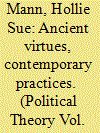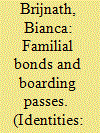| Srl | Item |
| 1 |
ID:
112367


|
|
|
|
|
| Publication |
2012.
|
| Summary/Abstract |
Earlier discussions of care have both insisted on its importance to political life and decried the unequal burden borne by women in care work. Yet they have failed to demonstrate why for reasons above and beyond the instrumental ends it serves. We ought to make the cultivation of an ongoing practice of caregiving a political priority. This article redefines and reframes care as a thoroughly critical and deeply embodied practice that is central to the flourishing of human beings. By way of Aristotle, I situate philia and embodied practices of care at the center of the shaping of the citizen and demonstrate a deeper significance of relations of care to our political life. When this is done alongside attention to habituation to right action and thinking, we can see more clearly how a particular kind of embodied politics can activate and sustain an ethic that cultivates citizens' capacities and desires to care.
|
|
|
|
|
|
|
|
|
|
|
|
|
|
|
|
| 2 |
ID:
107663


|
|
|
|
|
| Publication |
2011.
|
| Summary/Abstract |
With establishment of the U.S. Selective Service System in 1917, selective draft rules placed consideration of registrants' economic obligations to their dependents front and center. By observing the Canadian and British recruitment experiences, American policy makers opted against universal conscription since they believed it would be costly because of the need to offer family allowances and opted against a voluntary system since they believed that too many bachelors would fail to volunteer. Dependency deferments were designed to minimize the social and economic costs of war. Local board members determined whether a man was a genuine breadwinner or not, and individual discretion on this matter contributed to the higher rates of African American draftees during WWI compared to white draftees, since African American men were less likely to be recognized as genuine breadwinners. Selective Service rules thus resulted in reproducing female citizens as economic dependents and yielded durable inequalities among registrants.
|
|
|
|
|
|
|
|
|
|
|
|
|
|
|
|
| 3 |
ID:
087482


|
|
|
|
|
| Publication |
2009.
|
| Summary/Abstract |
In January 2007 a first generation Indian migrant with Australian citizenship travelled to the United States from Australia to provide care for her Indian grandmother with severe dementia. She did so because her grandmother's primary carer, the Indian migrant's maternal aunt, had to escort her Filipina maid of over ten years back to the Philippines, after the maid had suffered an aneurism and had recovered enough to express her desire to return home. The multiple narratives embedded in these few lines illustrate that in the daily lives of transnational families and caregivers, gender, generation, migration, access, and homeland come together in a myriad of ways that complicate understandings of traditional caregiving and raise the question: whose 'story' do we focus on? Using an expanded framework of global care chains as articulated by Nicola Yeates and Loretta Baldassar's work on caregiving in transnational families, I explore through this personal 'case-study' how each link within the chain maps to the other and the power dynamics that contextualise these links. Building on Yeates' work, I argue for the recognition of temporality in transnational caregiving and conclude with a call for further research and theorising on caregiving that takes account of the transformations and transactions that occur within families in a global context.
|
|
|
|
|
|
|
|
|
|
|
|
|
|
|
|